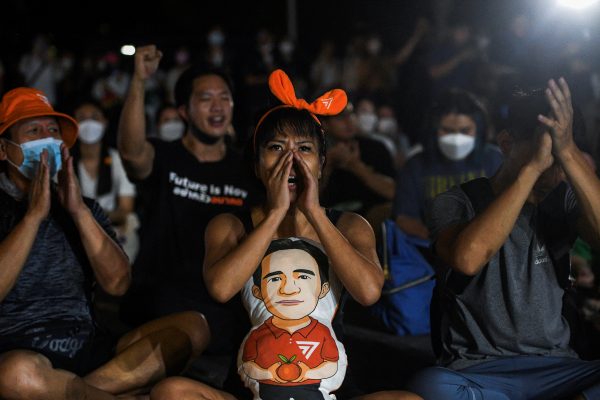Still, Move Forward’s surprise first-place showing in the May 2023 general elections speaks to new political dynamics and divides that have emerged since the most recent military coup in 2014 and the rule of military-backed parties after general elections in 2019.
Analysis of the results from May has shown how Move Forward made significant ground in regional areas where Pheu Thai and regional machines were dominant. Perhaps as significant now is a generational divide, as younger Thais fed up with the stifling political culture demand political and social reform. To many younger progressives, exiled former prime minister Thaksin Shinawatra and his proxy party, Pheu Thai, are just another part of the political establishment.
The enormous irony, as Patrick Jory observes in this week’s lead article, is that the surge in support for Move Forward’s emphatically reformist agenda has set Thailand up for ‘an historic political shift’ by making Thaksin and his allies the lesser of two evils in the eyes of the conservative elite who’ve sought to engineer the country’s institutional framework to deny him and his allies power since toppling Thaksin in a coup in 2006.
Having paid its reformist dues by supporting Move Forward though two doomed attempts to have Pita appointed prime minister on the floor of parliament, ‘it is Pheu Thai, which ran a respectable second place in the May election … which now appears to be taking the lead in forming an alternative, conservative coalition.’ Indeed, amid ‘conservative fears of a Move Forward government, it is also unlikely that the party will be allowed to be part of a coalition’ in any deal between Pheu Thai and junta-linked parties.
In October 2022 East Asia Forum speculated that a détente between Pheu Thai and the junta offered one possible way out of the impasse that has made Thailand’s politics dysfunctional and torn at its social fabric. There’s precedent for such bargains elsewhere in Southeast Asia. The incorporation of holdovers from the New Order regime into Indonesia’s post-1998 democracy has been an essential ingredient in its democratic stability, at the cost of its democratic quality. In Malaysia, Anwar Ibrahim’s cautiously reformist government owes its existence to support from the rump of UMNO, which was thrown out of office after 61 years in power by an electorate that had lost patience with its corruption.
If co-opting discredited authoritarian parties into government for the sake of stability helps to bed down a minimally democratic system in Thailand in the coming term of government, then there might be a case for a glass-half-full outlook on the possibility of a Pheu Thai–conservative coalition. But the emphatic victory of Move Forward — winning 38 per cent of the popular vote to Pheu Thai’s 28 per cent — means that the risks are arguably greater in denying the public the genuinely pro-democratic government they clearly want.
One unknown is what happens to Move Forward. Its previous incarnation, the Future Forward party, was dissolved in 2020 and its leader, Thanathorn Juangroongruangkit, banned from politics. Pita and Move Forward are vulnerable to the same treatment as they come under scrutiny about their obedience to Thailand’s capriciously-enforced election laws during the 2023 campaign.
There’s also uncertainty about the prospects of any Pheu Thai-led coalition and its strategy as the clock ticks down to May 2024. At that point, the term of the currently military-appointed Senate expires — and along with it, its constitutional prerogative to participate in the appointment of a prime minister, a power it has just used to block Pita Limjaroenrat’s elevation to the role.
Pheu Thai knows it risks a backlash by doing deals with junta-linked parties now, a move which it has justified on the pretext that Thailand needs somebody to govern until the sunset clause on the Senate’s kingmaker role comes into effect. It could face an even bigger one — from its own supporters, not to mention Move Forward’s — if it seeks to maintain its hold on power in coalition with conservatives beyond May.
Whoever emerges as the next government in Thailand will have their work cut out for them in addressing the country’s serious social and economic challenges. One of these is the stagnation of incomes and rising inequality which, as Thorn Pitidol wrote at East Asia Forum, was an ingredient in voters’ turn towards political alternatives like Move Forward.
Another is the importance of productivity-enhancing reforms — in competition, education and innovation — that will be required for Thailand to embrace new industries, mitigate the impact of its rapidly-ageing demographic profile, and shore up its automotive manufacturing industry as the world embraces electric vehicles and geopolitics threatens to undermine the multilateral trade system on which economies like Thailand depend so much.
The tragedy is that discussion of these policy challenges, and contest over alternative visions for addressing them, is a more prominent part of electioneering in Thailand than perhaps in anywhere else in Southeast Asia — even if the system makes it easy to void whatever preference the voters express on these matters. The May 2023 elections showed that Thailand’s public understands perfectly well the country’s need for change. It’s time their conservative elites caught up with them.
The EAF Editorial Board is located in the Crawford School of Public Policy, College of Asia and the Pacific, The Australian National University.

